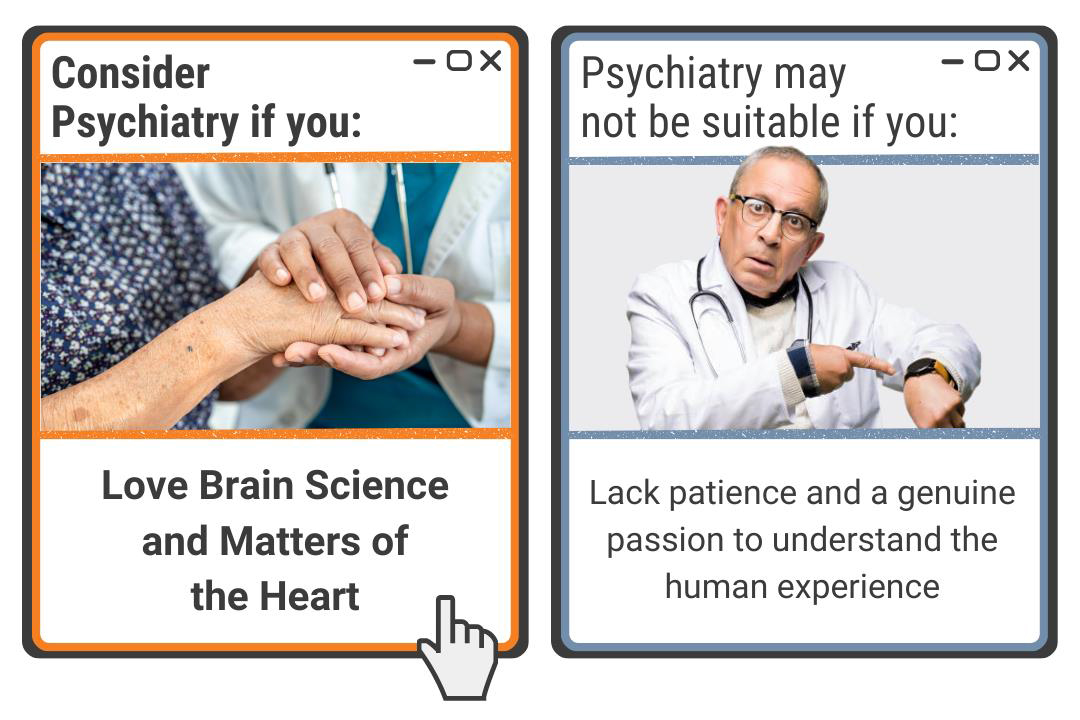8 April 2024
Specialty Select: Thinking of Specialising in Psychiatry? – Featuring Dr Lui Yit Shiang
Part of the Health Insider series on POMConnect.


When considering my specialisation in psychiatry, I initially found myself torn between the allure of family medicine or respiratory medicine. The former promised a holistic approach to patient care, while the latter seemed to offer the excitement of addressing acute conditions like pneumothorax or breathlessness. However, psychiatry presented itself as a unique amalgamation of these experiences, demanding a holistic examination of patients and providing treatment. What captivated me most was the opportunity to intervene in emergencies such as severe panic attacks, suicidal states, or acute psychotic episodes, where the psychiatrist serves as a steadfast companion on the patient's journey.
The most fulfilling aspect of my work in psychiatry lies in the ability to provide a listening ear and facilitate breakthroughs in psychological issues that have long plagued individuals. My subspecialisation in addiction medicine adds another layer of reward as I witness patients embarking on transformative journeys towards recovery, such as abstaining from alcohol before undergoing liver transplants. Witnessing individuals gain a new lease on life is profoundly uplifting.


However, psychiatry also comes with its share of challenges. The journey to recovery is often time-consuming and fraught with fluctuations. Like any chronic health condition, there are periods of progress and setbacks. Witnessing a patient relapse can be disheartening for both the patient and the clinician, raising doubts about treatment plans and causing emotional turmoil. Yet, it's essential to maintain optimism and encourage patients to persevere through these challenging times.
Success in psychiatry demands certain qualities and skills. An inquisitive mind and a passionate heart are paramount, sustaining one's interest in the discipline and guarding against burnout. Continuous upskilling is also crucial, as psychiatry evolves with advancements in treatment strategies and psychopharmacology. Compassion, not only towards patients and colleagues but also towards oneself, is indispensable in navigating the complexities of human suffering.
To junior doctors contemplating a career in psychiatry, I offer this advice: Do not pursue it for a preconceived lifestyle or if you believe it will be an “easy job”. You will want to embrace the challenge of addressing conditions like depression, schizophrenia, and dementia head-on. Deep dive into the existing research in psychiatry. Get involved in upscaling community efforts towards destigmatising mental health issues in the country and create safe spaces for discussion. Psychiatry is not a lucrative endeavour, but it is a deeply rewarding journey of service, as well as personal and professional growth.


Looking ahead, the field of psychiatry is briming with exciting developments. Research efforts are focused on expediting the path to recovery through innovative treatments, which include esketamine nasal sprays, transcranial magnetic stimulation, and advanced psychotherapeutic techniques, to name a few.
Unfortunately, there are common misconceptions about psychiatry, particularly regarding its perceived passivity or inactivity, merely prolonging the inevitable. As an addiction specialist, I often encounter scepticism about the effectiveness of psychiatric interventions. However, psychiatry is a legitimate medical discipline grounded in neuroscience and behavioural medicine, actively working to alleviate and potentially reverse disorders and suffering. The field of psychiatry is committed to progressive, proactive care that goes beyond just being a passive caretaker.
In conclusion, specialising in psychiatry offers a unique blend of challenges and rewards. It requires dedication, genuine compassion, and a commitment to lifelong learning. Despite misconceptions, psychiatry remains a dynamic and fulfilling field that holds the promise of transformative impact on individuals and communities alike.
Quick Take from a Specialist







